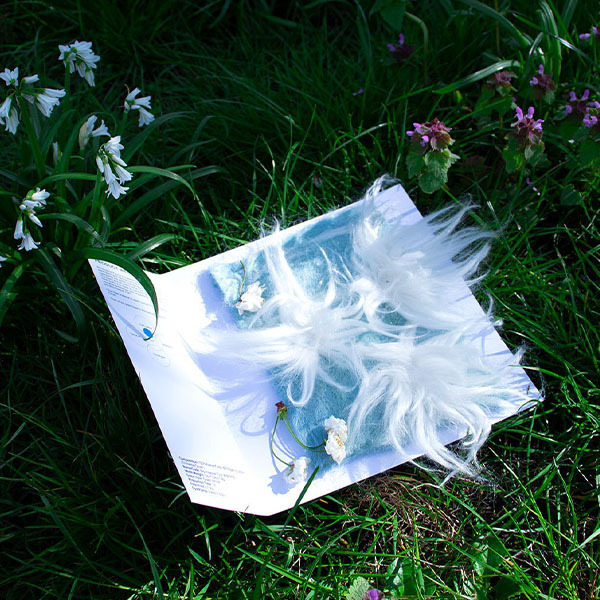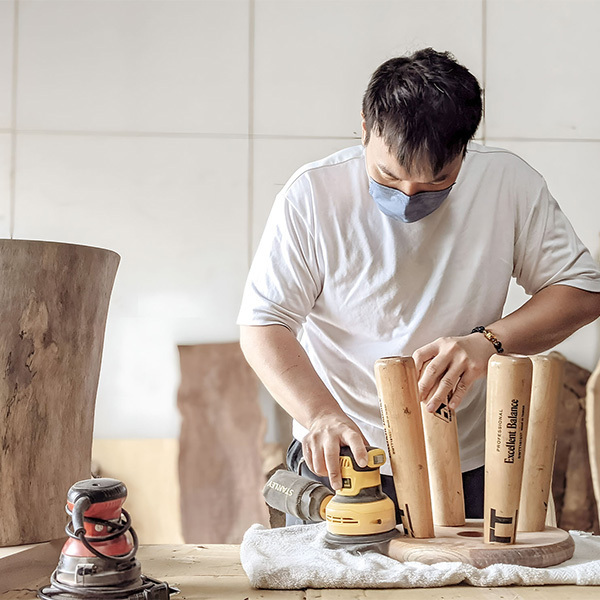Sea vegetable Circulation
SEA VEGETABLE COMPANY
Open Funk
re:Mix is a circular kitchen mixer that works with the glass jars people have at home, that’s customisable and built to last. It is ethically made in Berlin from regional, reused and recycled materials, and is repairable and open-source. re:Mix lays the groundwork towards changing the way we make and fix home electronics.
Frustrated with kitchen mixers breaking within months from purchase, we created a long-lasting, repairable kitchen mixer, to prove that circularity can go hand in hand with aesthetics and ease of use.
From electronic waste and huge CO2 emissions to poor working conditions and long supply chains, kitchen appliances contribute to some of the world’s most serious environmental and human rights problems of our times. They break easily, inhibit repairs and offer spare parts at exorbitant costs.
At every level, re:Mix is designed for the circular economy. In terms of materials, it reuses standard glass jars, has a 100% recycled, regional plastic casing, 100% recycled plastic feet, and uses locally 3D-printed parts. The design is modular and repairable, without the use of harmful adhesives. Assembly and repairs are done locally in Berlin in our own workshop. And a digital layer provides easy access to additional services: a buy-back scheme, a material passport and open-source documentation, guided repair tutorials, and easy spare part ordering.
Contrary to how appliances are built today, re:Mix is a local product made in Berlin. By using decentralised fabrication methods, publishing files open-source and using a local supply chain, we are circulating economic value in our community, creating local jobs and rebuilding the much-needed repair infrastructure. Our product design and production setup has been engineered to be replicable in other makerspaces such as FabLabs, while making use of locally-available materials - paving the way to a new type of scaling production and repairs for the local communities.
re:Mix is just the first step in paying the way for something bigger: A decentralised system for home electronics and components that are built and repaired locally, allowing anyone with a basic workshop to build their own home appliances - toasters, lamps, kettles, mixers, speakers and more; and anyone with a screwdriver to repair their own products.
REnato lab Chief Operations Officer
E-waste is the fastest-growing waste stream in the world, making household electronic products a key focus in terms of the circular economy. While most discussions tend to revolve around large brand manufacturers, initiatives like the re:Mix project explore the potential of every aspect of the product value chain. This includes modular design, material selection, repairs, and even reverse logistics. Additionally, they combine regional production with open-source design, showcasing both creativity and ambition.
Osaka Namari-Suzu Seirensho Co., Ltd. President and CEO
This project definitely has a seat at the dinner table.
It is also a great conversation starter.
The project addresses many questions on how we talk about what is good for the environment and embodies it in a playful functional kitchenware.
For one, consumption: using less, consuming less. Choosing well-made products made to last and to be tendered and fixed - contrasts to the models of limitless economic growth worship. Here, consumption has a ceiling. This reuse of glass jars stops us from consuming more storage containers, the mutli-mixer in-one reduces unidirectional e-waste.
Reduce, Reuse Recycle: The idea of adapting all jars around the house takes used jars back into the kitchen to reuse. When is reuse better than "recycling", by which measurements is it better than direct to landfill? The energy required to recycle the material is not always transparent to consumers, and not often in the public discourse, where only positive aspects of recycling is promoted.
Distributed: By making, adapting, and repairing an open and local process, knowing who makes the product, also makes it harder to throw away. It is a cultural shift (perhaps back in time), of how things and people interact. Wouldn’t it be wonderful if (outside of Europe) this mixer would be produced locally? Who will fix them? A community aspect to it would add to the pop / funky persona of the product. Would this be truly a distributed network and open-source? The business model would be nice if more elaborated.
Health: Avoiding health issues by using glass containers: chemical leaching from food touching plastics.
Plastic Mix: They also make the problem of "color" of recycled plastic waste into a design element, breaking the mold of how the "problem" of recycling mixed color plastics, is resolved in a playful way. (white is preferred, and sorting by color is an additional step in the recycling process. if not white, most recycled plastic uses dye to be turned gray/ black).
Attribution: finally, it would be nice to acknowledge the multi-headed, multi-purpose metal mixers found in many Indian (and perhaps other?) kitchens.
Architect, Founder of NARUSE・INOKUMA ARCHITECTS Co., Ltd.
Who doesn’t accumulate empty glass jars with the intention of using them someday? And who hasn’t been forced to dispose of a kitchen appliance after it mysteriously breaks down? This is a delightful and inventive project that brilliantly resolves such small daily frustrations. As kitchen appliances add more new functions, they become harder to manage. This food mixer has only the basic functions that we really need, making it less complicated and easier to repair. It’s a very rational concept. As jars come in many different sizes, I was curious to see how versatile it is.

Fair, circular solar panel
Biosphere Solar
MATR
MATR
TATAMI ReFAB PROJECT
HONOKA
Dodola
Pjorkkala
CirculaRElectronics by VERTMONDE
VERTMONDE ECUADOR
MateRe - DPP
digglue. inc
Transparent Solar Windows
VP for Ubiquitous Energy
Project "TSUMUGI"
General Incorporated Association Upcycle
The Mother Reef
Oyster Heaven
Anam PALF® by Ananas Anam
Ananas Anam
DiFOLD Origami Bottle
DiFOLD
Co-producing value-added, biodegradable plastics and additives from agricultural byproducts
Ourobio
Infinity Toy Box
Infinity Toy Box
Lichens as an bioindicators of "Well-being"
Yixuan Wang (collaborated with Julio Obscura)
Tejiendo la calle
Tejiendo la calle
comvey Share-Bag
Comvey. Inc. CEO
Creating a sustainable society. "Circular Action in daily life"
株式会社ECOMMIT ブランド戦略部 広報ブランディンググループ 所属
Hair Recycle
Dung Dung asbl
Lalaloop Reusable cup system for a circular city
OysterAble co., ltd.

Bio-invasive Textile Library
Bio-invasive Lab Ltd/ Central Saint Martin-Ma Biodesign
MateRe
digglue inc.
Briiv Air Filter
Five Create Ltd.
Gravity Wave - Plastic Free Oceans
GRAVITY WAVE
Seaweed Dialogues
Alberte Holmø Bojesen
Somewhere, Sometime
obake
